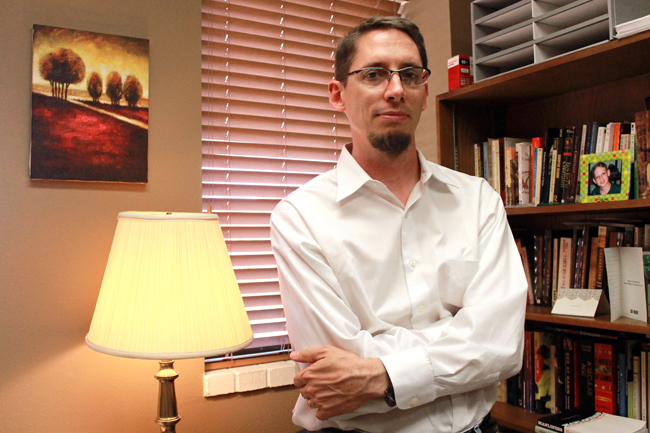The Sochi Olympics have drawn fire because of Russia’s law against “gay propaganda” and police repression of gay activists in the country. But gay activists aren’t just drawing attention to the expected abuse by Russian authorities, but also to Olympic sponsors, who, in their minds, legitimize discrimination by not speaking out forcefully enough against anti-gay laws. Scenes of activists being tackled while standing beside Coca-Cola logos and McDonald’s advertisements asking viewers to send “Cheers to Sochi” have only reinforced this initial impression. But when I think of Sochi, I don’t just think of a slew of spineless sponsors; I think of UT, and how UT is itself responsible for legitimizing anti-gay propaganda.
UT directly supported sociology professor Mark Regnerus’ “New Family Structures Study,” which showed the alleged negative effects of gay parents raising children, by issuing a glowing press release about the study on the official UT website. In it, they called the study “particularly significant” because it was the first large national sample of children raised by gay parents.
But the study’s overly broad definition of “gay,” which also drew mainly on gay parents who were already divorced, should have given UT reason to pause from the start. Questions in March 2013 about whether the Witherspoon Institute, a conservative think tank, played a concrete role in the study should have at least made the University question its original decision to jump on the bandwagon. While the University may have argued at the time that any flaws in Regnerus’ study should be hashed out in sociology conference halls, Regnerus himself has violated his own mandate. He promoted the study last year from Hawaii to Michigan, from Washington, D.C., to Eastern Europe, to argue that gays shouldn’t marry.
The University, in a letter to Attorney General Greg Abbott on Oct. 2, 2012 obtained in an open records request, attempted to explain its public relations collaboration with Regnerus. The letter argued that the study was not just Regnerus’ creation, but also the University’s “intellectual property.” The letter argued the University deliberations surrounding the study were confidential and not subject to release because its departments “offer direction or insight” to University officials about how to respond to the predicted backlash and how to articulate “the University’s position” on the study as a whole. That “direction or insight” led to the aforementioned press release.
For UT, it seems, the study wasn’t just a study backed by notoriously conservative funders, but rather UT’s study.
“It is the University’s responsibility to protect the fruits of the state’s investment by shielding from disclosure the details of its research efforts and discoveries.”
The University wished to “assure that its media responses accurately reflect the global educational mission critical to an institution of higher education. … The public’s perception of the University inevitably affects its broad educational policy. Our success in cultivating and maintaining good media relations either strengthens or weakens the University’s reputation in the community, state, and nation.”
To be fair, the Office of Public Affairs is generally open to promoting research when a professor requests assistance, no matter how obscure.
Some could argue that refusing initial support to a professor on a controversial topic would chill campus research and freedom of speech. That said, the University can defend its brand while respecting academic freedom. As the Austin Chronicle reported in September 2001, UT journalism professor Robert Jensen published a controversial op-ed in the Houston Chronicle claiming that 9/11, while atrocious, was no more horrendous than U.S. military actions abroad days after the attack. Then-UT President Larry R. Faulkner responded to Jensen in a letter to the Chronicle by saying he respected Jensen’s right to publish the piece, but that Jensen’s views did not represent those of the University. Jensen accepted those two arguments while rejecting Faulkner’s overall criticism that he was a “fountain of undiluted foolishness.” Jensen is still here, and as controversial as ever.
This exchange raises important questions: If Jensen had asked the Office of Public Affairs to publish his op-ed in a press release on the University website three days after 9/11, would they have done it? Secondly, if the head of a university can distance itself from an individual’s column, why can’t the University do the same for a press release promoting a poorly analyzed study, which has been misconstrued by its primary author and others to deny rights to a certain class of people? The University must allow for dissenting opinions and even research trial and error, but academic freedom does not require the University to rubber-stamp questionable research in high-stakes polarizing debates.
The University cannot replace promoting quality research with a public-relations spin and bad science. The press release makes UT as responsible for promoting the study as Regnerus himself. Having called out Jensen while helping Regnerus, the University comes off as politically selective in who or what it singles out, directly or indirectly, for rebuke or support. While some could argue that “all press is good press” for Regnerus and that he deserves no more attention, the study is still being used in legal arguments nationally and internationally to deny rights to others. With the world’s eyes turned on Sochi for the next two weeks, the University should start to rebuild its brand by owning up to its initial mistake, one that indirectly legitimized the anti-gay actions of Russia.
Knoll is a first-year master’s student in Latin American studies from Dallas.





















